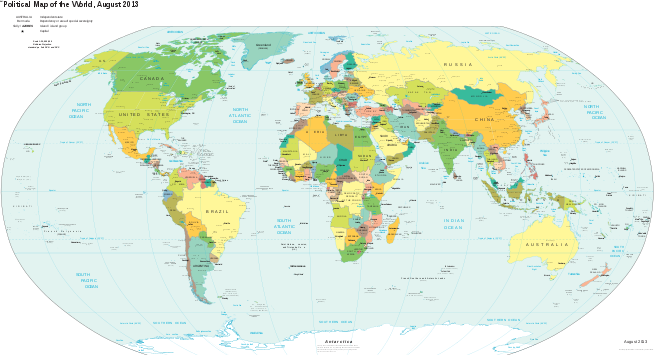
Main Difference
The main difference between Country and Nation is that the Country is a distinct region in geography; a broad term that can include political divisions or regions associated with distinct political characteristics and Nation is a community of people who share a common language, culture, ethnicity, descent, or history
-
Country
A country is a region that is identified as a distinct entity in political geography.
A country may be an independent sovereign state or part of a larger state, as a non-sovereign or formerly sovereign political division, or a geographic region associated with sets of previously independent or differently associated people with distinct political characteristics. Regardless of the physical geography, in the modern internationally accepted legal definition as defined by the League of Nations in 1937 and reaffirmed by the United Nations in 1945, a resident of a country is subject to the independent exercise of legal jurisdiction. There is no hard and fast definition of what regions are countries and which are not.
Countries can refer both to sovereign states and to other political entities, while other times it can refer only to states. For example, the CIA World Factbook uses the word in its “Country name” field to refer to “a wide variety of dependencies, areas of special sovereignty, uninhabited islands, and other entities in addition to the traditional countries or independent states”.[Note 1]
-
Nation
A nation is a stable community of people, formed on the basis of a common language, territory, history, ethnicity, or psychological make-up manifested in a common culture.
A nation is more overtly political than an ethnic group; it has been described as “a fully mobilized or institutionalized ethnic group”. Some nations are ethnic groups (see ethnic nationalism) and some are not (see civic nationalism and multiculturalism).It is a cultural-political community that has become conscious of its autonomy, unity, and particular interests.Benedict Anderson has characterised a nation as an “imagined community” and Paul James sees it as an “abstract community”. A nation is an imagined community in the sense that the material conditions exist for imagining extended and shared connections. It is an abstract community in the sense that it is objectively impersonal, even if each individual in the nation experiences him or herself as subjectively part of an embodied unity with others. For the most part, members of a nation remain strangers to each other and will likely never meet. Hence the phrase, “a nation of strangers” used by such writers as Vance Packard.
-
Country (noun)
An area of land; a district, region. from 13th c.
-
Country (noun)
A set region of land having particular human occupation or agreed limits, especially inhabited by members of the same race, language speakers etc., or associated with a given person, occupation, species etc. from 13th c.
-
Country (noun)
The territory of a nation, especially an independent nation state or formerly independent nation; a political entity asserting ultimate authority over a geographical area. from 14th c.
-
Country (noun)
A rural area, as opposed to a town or city; the countryside. from 16th c.
-
Country (noun)
ellipsis of country musicfrom 20th c.
-
Country (noun)
The rock through which a vein runs.
-
Country (noun)
The female genitalia, especially the vagina.
-
Country (adjective)
From or in the countryside or connected with it.
-
Country (adjective)
Of or connected to country music.
-
Nation (noun)
A historically constituted, stable community of people, formed on the basis of a common language, territory, economic life, ethnicity and/or psychological make-up manifested in a common culture.
“The Roma are a nation without a country.”
“The Kurdish people constitute a nation in the Middle East”
-
Nation (noun)
A sovereign state.
“Though legally single nations, many states comprise several distinct cultural or ethnic groups.”
-
Nation (noun)
An association of students based on its members’ birthplace or ethnicity. t
“Once widespread across Europe in medieval times, nations are now largely restricted to the ancient universities of Sweden and Finland.”
-
Nation (noun)
A great number; a great deal.
-
Nation (noun)
Damnation.
-
Nation (adverb)
Extremely, very.
-
Country (noun)
a nation with its own government, occupying a particular territory
“the country’s increasingly precarious economic position”
“Spain, Italy, and other European countries”
-
Country (noun)
the people of a nation
“the whole country took to the streets”
-
Country (noun)
districts and small settlements outside large urban areas or the capital
“a country lane”
“the airfield is right out in the country”
-
Country (noun)
an area or region with regard to its physical features
“a tract of wild country”
-
Country (noun)
a region associated with a particular person, work, or television programme
“an old mansion in Stevenson’s ‘Kidnapped’ country”
-
Country (noun)
short for country music
